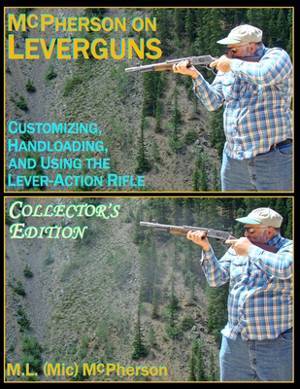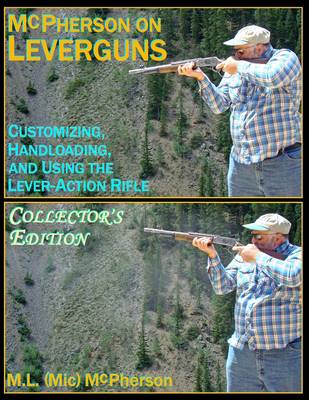
- Afhalen na 1 uur in een winkel met voorraad
- Gratis thuislevering in België vanaf € 30
- Ruim aanbod met 7 miljoen producten
- Afhalen na 1 uur in een winkel met voorraad
- Gratis thuislevering in België vanaf € 30
- Ruim aanbod met 7 miljoen producten
Zoeken
McPherson On Leverguns
Customizing, Handloading, And Using The Lever-Action Rifle
M L (MIC) McPherson
Paperback | Engels | McPherson on Firearms, Accuracy, Handloading, and Gunsmithing (Black and White Book) | nr. 2
€ 78,45
+ 156 punten
Uitvoering
Omschrijving
Soft Cover, Collector's Color edition: 394 pages, 81/2- by 11-inch (21.6- by 27.9-cm) pages, with 411 color photographs (Premium Color, hardback and soft-cover; Standard Color, soft-cover; Black and White, hardback and soft cover; and e-book editions available): In this compilation, McPherson covers every aspect of getting the most out of traditional lever-action guns, through modification, improvement, handloading, and shooting techniques. He chronicles custom modifications of Marlin 1894 and 336-based guns. Now retired, during his career he built dozens of custom Marlin lever-action rifles. Among these were 17-caliber varmint rifles (built around the 1894 Marlin) that launch 20-grain bullets at 4500-fps and deliver quarter-MOA accuracy and the mighty 510 Kodiak Express (based on the modern 1895 Marlin), in which top-end loads safely generate more than 5000 foot-pounds of muzzle energy with better than MOA accuracy. He built other custom Marlins in several wildcat chamberings and many customized Marlins in mainstream chamberings such as the 30-30 and 35 Remington and others in less common chamberings such as the 475 and 500 Linebaugh. He specialized in lightweight carbines. Because the custom lightweight super-carbine he built for his late wife, Peggy, was so popular, he adopted the moniker his friends, Jim Williamson and Rick Hartman gave it: The Peggy Rifle. He then applied that name to all custom lightweight Marlins he built. The articles collected in this book cover many of the rifles he built in more than three decades of gunsmithing. The goal is to document his perfection of the Marlin lever-action rifle. However, many of the improvements and modifications outlined in this book equally apply to traditional Winchester lever-action rifles. In addition, this book includes sections detailing some of his more complicated modifications, as required to perfect the Marlin. Included are sections explaining how he built a 41/2-pound 336 Marlin chambered in 35 Remington. A complete discussion details how to alter these guns to handle both standard-length loads and significantly longer loads. Other sections explain how to significantly strengthen these actions. Another section explains how to improve buttstock attachment, to improve accuracy and buttstock durability. For completeness, he includes articles on: a custom 35 Whelen Ackley-Improved, Remington Pump; a custom 221 Fireball, 788 Remington; and, a photographic journal of the rifle he and a friend built to launch bullets faster than one-mile per second, with useful varminting accuracy, limited barrel heating, and long barrel life. Included is his dissertation on personal freedom and the importance of understanding why it now exists in some places, if tenuously.
Specificaties
Betrokkenen
- Auteur(s):
- Uitgeverij:
Inhoud
- Aantal bladzijden:
- 396
- Taal:
- Engels
- Reeks:
- Reeksnummer:
- nr. 2
Eigenschappen
- Productcode (EAN):
- 9781717954114
- Verschijningsdatum:
- 31/07/2018
- Uitvoering:
- Paperback
- Formaat:
- Trade paperback (VS)
- Afmetingen:
- 216 mm x 279 mm
- Gewicht:
- 1270 g

Alleen bij Standaard Boekhandel
+ 156 punten op je klantenkaart van Standaard Boekhandel
Beoordelingen
We publiceren alleen reviews die voldoen aan de voorwaarden voor reviews. Bekijk onze voorwaarden voor reviews.











